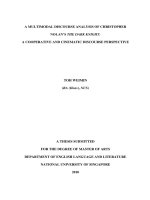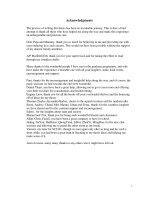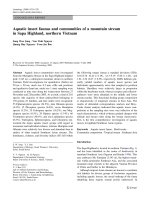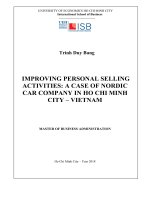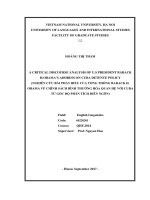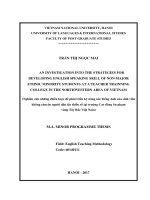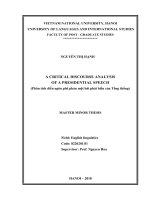Discourse communities of a sale company
Bạn đang xem bản rút gọn của tài liệu. Xem và tải ngay bản đầy đủ của tài liệu tại đây (35.58 KB, 4 trang )
Discourse Communities
April 25, 2017kellimooreenglishcomp2
Kelli Moore
English Comp 2
Professor Blasi
21 March 2017
The Specifics of Retail Discourse
As written by Julia Gilstein from the Salem Press Encyclopedia, “A discourse
community is a group of people who share certain characteristics and interests and,
as a result of ongoing communications within that group, share language practices
for communicating the group’s goals” (Gilstein). Our daily lives are being constantly
ran through discourse and discourse communities without us even realizing it. We
have daily discourse with our families, peers at school, professors, or even just
random people on the train. Although discourse and speech between peers and
others is a common, daily practice, most people belong to specific discourse
communities in which they share thoughts and ideas.
The main discourse community that I belong to is that of my job in retail, at Hollister
Co in Cherry Hill, New Jersey. Much like most other retail stores, our overall common
goal is to promote sales, make money for the company, and provide excellent
customers service that will make the customer want to return. Our style and vibe is
“beachy”, so we like to keep our store feeling laid-back and care-free. Although retail
jobs are usually loathed and feared by many, our community has always been one
that makes workers want to come back and be excited for their shifts. The managers
offer a positive, rewarding, and calm attitude. This should not be fooled for being
lazy and something to take advantage of. They manage to be laid-back while still
enforcing rules and encouraging their workers to work hard and complete their
tasks. As workers, we are always encouraged to approach customers with a smile
and to offer help to anyone and everyone, even if it means dropping your current
task to go and find a jean size in the stock room for someone. I have been with the
company for almost a year and a half, and the main reason I have stayed so long was
the relationships and bonds that associates are able to form with each other, their
managers, and even customers.
My discourse community often uses both verbal and textual communications on the
daily basis. There is an associate text message group chat in which each of the store
associates joins when they start working with the store. In this group chat, associates
ask their peers for coverage for shifts, or even just general questions about the job or
their schedule. The group chat was created for there to be an easy, laid-back
discourse between associates in order to have their problems solved before taking it
up with a manager. As for verbal, associates are almost constantly speaking with
others at the job. They speak within their own discourse community when talking to
managers or other associates. But since this community is found in a retail job,
associates are always engaging in discourse with the customers of the store; another
discourse community of its own. Lastly, there is a “Company Corkboard” hanging up
in the back of the store inside of the stock room. On this board, there are multiple
papers hung up in order to keep associates informed on how the store is doing, if
there are any upcoming corporate events, or even “if there was an alternation of
mall hours” (Chen). When surveying my fellow associates, I came to see that
although each person believed both verbal and textual discourse were imperative to
our community, their final answers on which was used more depended exactly on
what position they work in the store.
I surveyed a mixture of both Brand Reps, which are sales associates who do tasks
such as folding clothes, helping customers, and running the cash registers, and Stock
Associates, which are associates who work primarily in the stock room, performing
tasks like back stocking clothes, censoring shipment boxes, and preparing for store
floorset updates. I began to realize that brand reps exclusively said they believed that
verbal communication was used more commonly in the store, while stock associates
also exclusively said they used textual communication more. This is directly caused
by the fact that stock associates spend most of their shifts alone in the stock room,
while brand reps are almost always out in the front of the store speaking to
customers.
When I asked the question, “Do you communicate with your coworkers more often
through text messaging or verbal speaking?”, the only people to answer with “text
messaging” were the stock associates. They also seemed to be the associates that
checked the text message group chat the most often, with one stock associate
Corinne LaGrange answering with, “3-4 times a day” (LaGrange). Another associate
that started out working stock when they first joined the company but now works
brand rep shifts sometimes, Collin Blanchard, answered this question with “every
day” (Blanchard).
These answers are different than that of a full time brand rep. Justine DeLa Cruz, a
brand rep of almost two years, answered that she only check the group chat
whenever she sees there is a notification on her phone (DeLa Cruz), as well as 7-
month brand rep Sydney Gallagher, who replied “only check when someone texts in
it” (Gallagher). Brand reps, or sales associates, are the ones who believe they use
verbal communication more often at work, mainly between other associates and
coworkers. Gallagher again stated, “I feel that the interactions between associates
and managers are always friendly and motivational” when asked how she felt about
the discourse of the environment (Gallagher).
When interviewing my fellow workers, I began to see that there were some
discourse issues that had arisen. Two separate associates, one brand rep and one
stock associate, both said that the close-knit type of community that we hold is
almost like a breeding ground for gossip. Brand rep and key holder Ali Flanagan was
asked how she felt about the discourse of our environment, and she stated, “I think
we are all carried away (even me) talking to other associates and customers
complain about it! So we should take care of the customers first then move to us!”
(Flanagan). Stock associate Corinne LaGrange answered the same question with “I
think we have a positive work environment with our communication. I feel
comfortable talking to my managers about any issues. I think one communication
problem is that we gossip too much and it takes us away from our work.” (LaGrange).
Too much of a positive and laid-back discourse can lead to problems, such as gossip,
feeling comfortable enough to be on your phone in front of customers and they in
turn complain about incompetence, and lack of focus.
John Swales has came up with six key criteria in defining a discourse community. He
writes, “he defining characteristics of a discourse community might be (1)
communality of interest, (2) mechanisms for intercommunication between members,
(3) survival by providing information and feedback, (4) development of genre-specific
discoursal expectations, (5) possession of an embedded dynamic towards an
increasingly shared and specialized terminology, and (6) a critical mass of members
with a suitable degree of relevant discoursal and content expertise.” (Swales). These
six criteria are imperative when looking at the community of Cherry Hill Hollister Co.
We each have a common interest, which is primarily to make the company money
and to promote a positive environment for ourselves and our customers. Our text
message group chat is our main mechanism for “intercommunication between
members” (Swales). As workers, we are constantly receiving feedback from our
managers during “five minute meetings”, which are short meeting with one of the
managers during the end of your shift. In these meetings, there is a discussion about
your performance at the store recently, what you are doing right, and what could use
improvement. Our company has developed specialized speech as well. Instead of
calling people sales associates, we call them brand reps. We have specific words for
specific tasks, such as back stock, taking a lap, and standardizing.
Conclusion
In summary, when looking at the deeper, bigger picture of all of this, it is important
to see how the discourse community of Cherry Hill Hollister Co. is crucial in shaping
how all other retailers create a safe, fun, and supportive work environment for their
workers. Our leaders treat us with respect while still making sure we don’t hate
coming to work every shift. They give us opportunities to get involved with the
surrounding communities. For example, my discourse community worked with local
Pennsylvania charity Operation Warm to donate our old, unused coats to children
and families in need of a warm winter jacket. My community is not just a group of
workers coming together and speaking every few days about work activities, we have
grown to be a family and a group that deeply cares for one another and others. We
have taken our care for one another and the company and translated that into care
for others in surrounding communities.
References
Blanchard, Collin. Personal Interview. 8 March 2017.
Chen, Amanda. Personal Interview. 10 March 2017.
DeLa Cruz, Justine. Personal Interview. 9 March 2017.
Flanagan, Ali. Personal Interview. 8 March 2017.
Gallagher, Sydney. Personal Interview. 9 March 2017.
Gilstein, Julia. “Discourse Community.” Salem Press Encyclopedia, January.
EBSCOhost, login.proxy.libraries.rutgers.edu/login?url= />login.aspx?direct=true&db=ers&AN=90558295&site=eds-live.
LaGrange, Corrine. Personal Interview. 9 March 2017.
Swales, John. “Approaching The Concept of Discourse Community.” (n.d.): n. pag.
ERIC. Web. 18 Mar. 2017.
